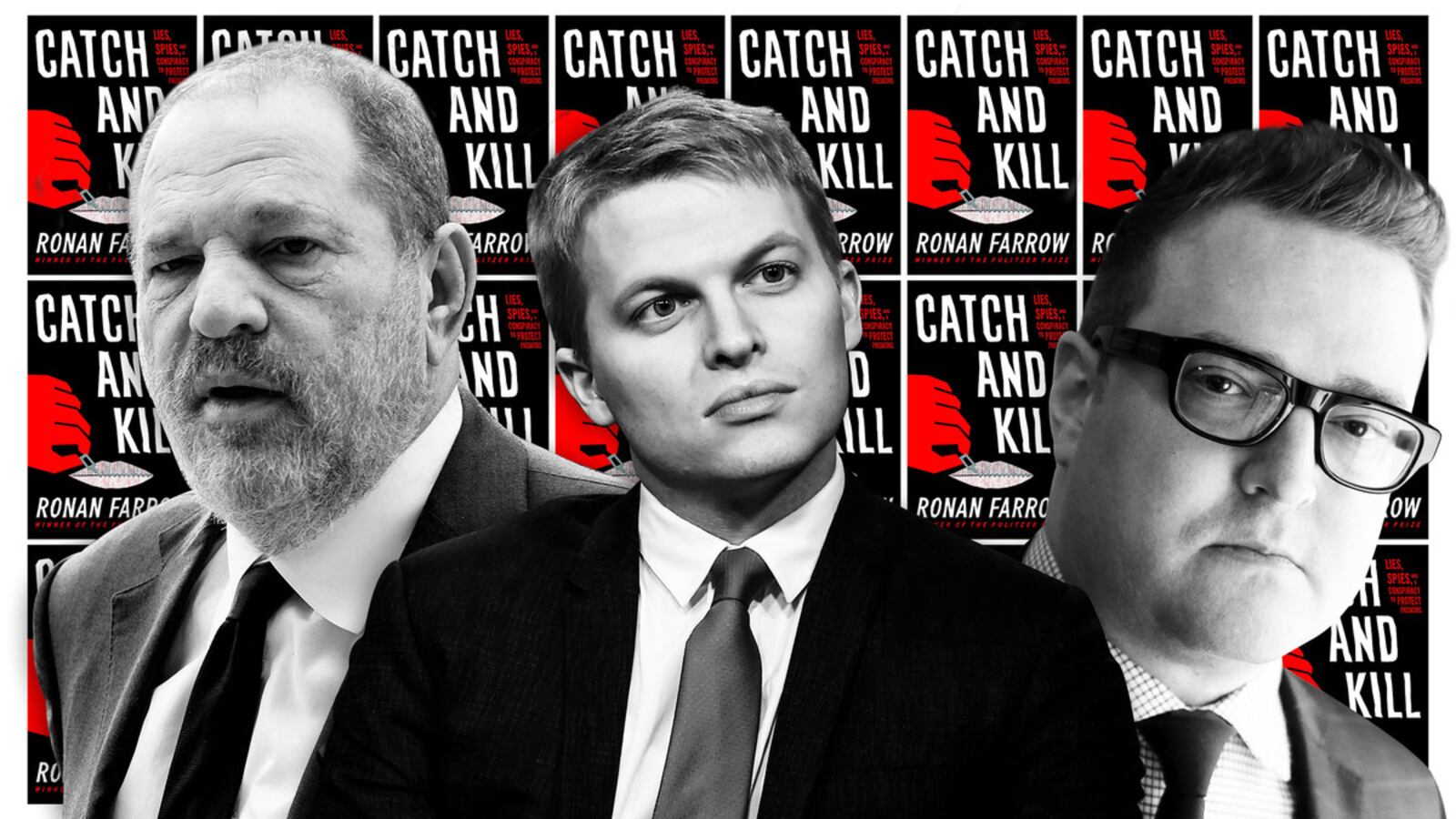It’s no wonder that former National Enquirer Editor in Chief Dylan Howard has hired a multinational team of lawyers on three continents in an attempt to suppress New Yorker writer Ronan Farrow’s Catch and Kill.
The picture that emerges of the 37-year-old Australian scandalmonger in Farrow’s book, already the No. 2 bestseller on Amazon.com the day before its official Oct. 15 release, is of a vindictive braggart who—along with David Pecker, the chief executive of the Enquirer’s parent company American Media Inc.—toiled diligently to protect disgraced Hollywood mogul Harvey Weinstein and Donald Trump.
Howard, along with AMI, is one of the principal subjects of Farrow’s book; the other is Farrow’s former employer, NBC News, whose top executives killed his Harvey Weinstein scoop, Farrow claims, in order to protect star anchor Matt Lauer from Weinstein’s veiled threats to expose Lauer’s own sexual misconduct.
Catch and Kill has prompted NBC to go to war in recent days, furiously defending NBC News and MSNBC Chairman Andy Lack and NBC News President Noah Oppenheim against Farrow’s allegations, and attacking the author as a disgruntled ex-employee with an axe to grind.
Farrow’s book derives its name from the tabloid practice of “catch and kill,” whereby publications purchase a subject’s story in order to bury or silence it.
For example, in his book, Farrow details the story of former Playboy-playmate Karen McDougal, who claimed she had an affair with Donald Trump, and in 2016 received $150,000 from AMI for her life rights, which effectively silenced her. The Wall Street Journal first reported McDougal’s alleged catch-and-kill deal just days before the 2016 presidential election.
Howard and Pecker later struck an immunity deal with federal prosecutors investigating Trump-related campaign law violations in the Southern District of New York.
Farrow’s revelations about Howard, Pecker and AMI—based in part on his previous reporting in The New Yorker—detail multiple instances in which Howard was allegedly at Harvey Weinstein’s beck and call, participating in damage-control strategy sessions and dropping everything to rush to the producer’s side while ordering AMI reporters to gather negative material on actress Rose McGowan, who had accused Weinstein of raping her in a hotel room at the 1997 Sundance Film Festival.
“I want dirt on that bitch,” Farrow quotes Howard declaring in reference to McGowan, after another actress, Ashley Judd, claimed that an unnamed studio head (whom she later identified as Weinstein) had sexually harassed her.
“AMI reporters were asked to pursue negative items about her going to rehab,” Farrow writes about Judd.
Farrow recounts another incident—which Howard denies—in which the Enquirer editor allegedly was at Weinstein’s service in early October 2017, as The New York Times was readying its blockbuster story on the mogul’s misconduct:
“The first week of October, Weinstein’s assistants emailed Dylan Howard: ‘We just tried you, but Harvey wanted to see if you could instead meet him in front of the NY Times Building on 8th Ave near 43d Street. He’s on his way up there no [sic] so should be there in about 30 minutes.’
“Originally, Weinstein had asked his staff to make sure Howard joined him and Lisa Bloom for the drive uptown from the Weinstein Company offices to the Times. But Bloom and Weinstein had left without Howard, so the Enquirer editor would have to scramble uptown himself, manila folders in hand, containing ‘basically dirt’ on Weinstein’s accusers…”
Farrow also reports an incident in which Howard met over breakfast at the Tribeca Grill with Weinstein, the mogul’s lawyer Lanny Davis, and an operative from the Israeli private surveillance company Black Cube as they discussed possible strategies to combat Rose McGowan.
And when the Times story was finally published on Oct. 6, 2017, Howard was at the Weinstein Company, offering moral support and helping with damage control, Farrow writes. “Oh shit,” he exclaimed when the exposé hit the internet.
After Italian-Filipina model Ambra Battilana Gutierrez filed a complaint with the New York Police Department accusing Weinstein of groping her breasts, “Weinstein particularly exploited his bond with Pecker and Howard at the National Enquirer,” Farrow writes. “Weinstein’s employees recalled an uptick in calls from him to Pecker. Howard ordered his staff to stand down on reporting about Gutierrez’s claim, then inquired about purchasing her story in order to bury it. And then there was the item the Enquirer ultimately ran, claiming, apparently based on its own entreaties to Gutierrez, that she was flogging the story on the open market.”
Farrow also writes about Howard in personal terms. He “had a vindictive streak” and boasted about scandalous knowledge that gave him leverage over the rich and powerful.
Quoting “friends and colleagues of Dylan Howard,” Farrow writes that AMI’s former chief content officer “had boasted he had evidence that Trump may have fathered a love child with his former housekeeper in the late 1980s. Howard ‘would sometimes say things when he was drunk or high. Including telling me they would pay for stories and not publish, to protect people,’ one of his friends told me. ‘You don’t forget when someone says, ‘Oh, by the way. The maybe-future president has a love child.’”
Reached by The Daily Beast, Howard declined to comment on Farrow’s book. “I’m sure you will get a response from my lawyers or AMI,” he texted.
Howard’s London-based lawyer Paul Tweed—whose eponymous law firm is one of three that the tabloid muckraker has hired to combat Farrow’s book (with the other two being New York’s Kravet & Vogel and Australia’s McLachlan Thorpe Partners)—emailed: “We have advised Mr. Howard to make no further comment at this stage, while all legal options and jurisdictions are being considered.”
An AMI spokesperson, while not specifically addressing Farrow’s allegations, emailed: “Mr. Farrow’s narrative is driven by unsubstantiated allegations from questionable sources and while these stories may be dramatic, they are completely untrue.”







